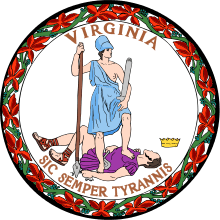Virginia ballot measures, 2002
The 2002 Virginia State Elections took place on Election Day, November 5, 2002, the same day as the U.S. Senate and the U.S. House elections in the state. The only statewide elections on the ballot were two constitutional referendums to amend the Virginia State Constitution and two government bond referendums. Because Virginia state elections are held on off-years, no statewide officers or state legislative elections were held. All referendums were referred to the voters by the Virginia General Assembly.[1]
Question 1
The Judicial Power and Jurisdiction Act spells out in detail when and how a convicted felon may petition the Virginia Supreme Court (and thus bypass lower courts) to issue a writ of actual innocence. The petition must claim that the petitioner is actually innocent of the crime for which he or she was convicted, set out an exact description of the human biological or DNA evidence and testing supporting his or her innocence, and explain that the evidence was not available when the petitioner was convicted. The Supreme Court may dismiss or grant the petition and may overturn or modify the conviction after it considers the petition and the Commonwealth's response, the previous records of the case, and other evidence it may require.
Question 1
| Choice |
Votes |
% |
 Yes Yes |
1,091,828 |
72.71 |
| No |
409,807 |
27.29 |
Question 2
The proposed amendment authorizes local governments in the state to create a tax exemption for certain properties by an ordinance and eliminates the need for action by the General Assembly. The amendment provides that the local governing body may adopt an ordinance to exempt property "used by its owner for religious, charitable, patriotic, historical, benevolent, cultural, or public park and playground purposes." The General Assembly continues to have authority to enact laws setting out restrictions and conditions on these tax exemptions.
Question 2
| Choice |
Votes |
% |
 Yes Yes |
964,441 |
64.32 |
| No |
534,956 |
35.68 |
Bond Question 1
The Educational Facilities Act allows the Commonwealth to sell a maximum of $900,488,645 dollars in bonds for the purpose of raising funds to pay for capital projects at state-supported colleges, universities, museums and other educational facilities.
Bond Question 1
| Choice |
Votes |
% |
 Yes Yes |
1,126,932 |
72.88 |
| No |
419,423 |
27.12 |
Bond Question 2
The Parks and Recreational Facilities Act allows the Commonwealth to sell a maximum of $119,040,000 dollars in bonds for the purpose of raising funds to pay for capital projects at state-supported parks and recreational facilities.
Bond Question 2
| Choice |
Votes |
% |
 Yes Yes |
1,051,393 |
68.79 |
| No |
477,058 |
31.21 |
References
|
|---|
|
U.S.
Senate | |
|---|
|
U.S.
House | |
|---|
|
State
governors | |
|---|
|
States
generally |
- Alabama
- Alaska
- Arizona
- Arkansas
- California
- Colorado
- Connecticut
- Delaware
- Florida
- Georgia
- Hawaii
- Idaho
- Illinois
- Indiana
- Iowa
- Kansas
- Kentucky
- Louisiana
- Maine
- Maryland
- Massachusetts
- Michigan
- Minnesota
- Mississippi
- Missouri
- Montana
- Nebraska
- Nevada
- New Hampshire
- New Jersey
- New Mexico
- New York
- North Carolina
- North Dakota
- Ohio
- Oklahoma
- Oregon
- Pennsylvania
- Rhode Island
- South Carolina
- South Dakota
- Tennessee
- Texas
- Utah
- Vermont
- Virginia
- Washington
- West Virginia
- Wisconsin
- Wyoming
|
|---|
